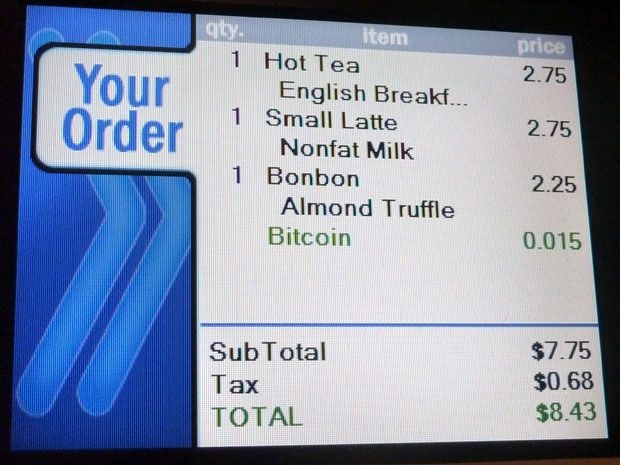 A couple of weeks ago California officially killed a law prohibiting the use of any currency that’s not the “lawful money of the United States,” like community currencies, frequent customer points, or bitcoin. The law had been ignored for so long few people knew it even existed. Certainly the first wave of Silicon Valley area restaurant owners who started taking this virtual currency for real food didn't, including San Francisco’s Ramen Underground, Sake Zone, and Buyer’s Best Friend; Sunnyvale’s Ocean Blue Sushi Club, San Rafael’s Nova Rosti, Palo Alto’s Coupa Café, and multiple locations of Curry Up Now. I visited Coupa Café and Curry Up Now this week to see how the whole Bitcoin restaurant thing is working. It’s not surprising that Coupa Café, a Venezuelan-themed café in downtown Palo Alto, was an early early adopter of bitcoin. The bustling restaurant is a high-tech hub, where entrepreneurs and venture capitalists huddle around the tightly packed tables talking product rollouts or business strategy, or solo diners peck away at laptops, taking advantage of the high-speed Wi-Fi. Coupa Café's known for testing out all sorts of new technologies, sometimes just as a favor to a café regular, sometimes for a tiny piece of equity. Co-founder Jean-Paul Coupal says he started thinking about taking Bitcoin payments way back in 2012, when he’d found himself reading a lot about the currency. The trick was making bitcoin easy for customers and staff to handle; that involved programming the registers to display prices in bitcoins as well as dollars, putting a smartphone near the register with an app that tracks bitcoin deposits, and displaying a QR code. A customer uses the QR code to connect to a payment website, transfers in the appropriate amount of bitcoins, and the cashier can see the transfer go through on the app before closing the sale. One thing not yet automated—putting in the exchange rate that allows the system to convert dollar prices to bitcoin. Coupal says that number is entered manually once a day. He’ll be adding Bitcoin capabilities to another Coupa location in the Stanford business school within the next few months. Coupal has added a feature to his Bitcoin transactions system that’s not exactly necessary, but it’s fun. He gets an alert on his phone every time a customer pays with bitcoins. So far, the alerts aren’t driving him crazy; only a few customers a day use the currency. Coupal reports that it’s going smoothly, but a friend of mine who recently found herself behind a customer paying with bitcoin at Coupa says there was a bit of confusion as the customer went back and forth between registers trying to get the QR code to work. Unlike many restaurants that take Bitcoin, the bitcoins that go into Coupa’s system are not quickly converted into dollars. Coupal believes in Bitcoin, and hasn’t cashed out any of the Bitcoin payments received to date. Coupa does little promotion of its Bitcoin option; a small sign on the front counter and tiny Bitcoin price on the register display is the extent of it. Curry Up, a couple of blocks away from Coupa, is taking an even lower key approach to Bitcoin—they don’t have any signage about the currency in the restaurant at all. (Although they do have a sign stating that they do NOT accept American Express). Instead, the restaurant relies on word of mouth, reports Zachary Howard, a Curry Up supervisor. Curry Up typically only processes one or two Bitcoin transactions each week. The restaurant has only been taking the currency since April; maybe now that Bitcoin is legal the restaurant will put up a sign.
A couple of weeks ago California officially killed a law prohibiting the use of any currency that’s not the “lawful money of the United States,” like community currencies, frequent customer points, or bitcoin. The law had been ignored for so long few people knew it even existed. Certainly the first wave of Silicon Valley area restaurant owners who started taking this virtual currency for real food didn't, including San Francisco’s Ramen Underground, Sake Zone, and Buyer’s Best Friend; Sunnyvale’s Ocean Blue Sushi Club, San Rafael’s Nova Rosti, Palo Alto’s Coupa Café, and multiple locations of Curry Up Now. I visited Coupa Café and Curry Up Now this week to see how the whole Bitcoin restaurant thing is working. It’s not surprising that Coupa Café, a Venezuelan-themed café in downtown Palo Alto, was an early early adopter of bitcoin. The bustling restaurant is a high-tech hub, where entrepreneurs and venture capitalists huddle around the tightly packed tables talking product rollouts or business strategy, or solo diners peck away at laptops, taking advantage of the high-speed Wi-Fi. Coupa Café's known for testing out all sorts of new technologies, sometimes just as a favor to a café regular, sometimes for a tiny piece of equity. Co-founder Jean-Paul Coupal says he started thinking about taking Bitcoin payments way back in 2012, when he’d found himself reading a lot about the currency. The trick was making bitcoin easy for customers and staff to handle; that involved programming the registers to display prices in bitcoins as well as dollars, putting a smartphone near the register with an app that tracks bitcoin deposits, and displaying a QR code. A customer uses the QR code to connect to a payment website, transfers in the appropriate amount of bitcoins, and the cashier can see the transfer go through on the app before closing the sale. One thing not yet automated—putting in the exchange rate that allows the system to convert dollar prices to bitcoin. Coupal says that number is entered manually once a day. He’ll be adding Bitcoin capabilities to another Coupa location in the Stanford business school within the next few months. Coupal has added a feature to his Bitcoin transactions system that’s not exactly necessary, but it’s fun. He gets an alert on his phone every time a customer pays with bitcoins. So far, the alerts aren’t driving him crazy; only a few customers a day use the currency. Coupal reports that it’s going smoothly, but a friend of mine who recently found herself behind a customer paying with bitcoin at Coupa says there was a bit of confusion as the customer went back and forth between registers trying to get the QR code to work. Unlike many restaurants that take Bitcoin, the bitcoins that go into Coupa’s system are not quickly converted into dollars. Coupal believes in Bitcoin, and hasn’t cashed out any of the Bitcoin payments received to date. Coupa does little promotion of its Bitcoin option; a small sign on the front counter and tiny Bitcoin price on the register display is the extent of it. Curry Up, a couple of blocks away from Coupa, is taking an even lower key approach to Bitcoin—they don’t have any signage about the currency in the restaurant at all. (Although they do have a sign stating that they do NOT accept American Express). Instead, the restaurant relies on word of mouth, reports Zachary Howard, a Curry Up supervisor. Curry Up typically only processes one or two Bitcoin transactions each week. The restaurant has only been taking the currency since April; maybe now that Bitcoin is legal the restaurant will put up a sign.
Taking Bitcoin for Payment in California is Now Legal
Posted on at



